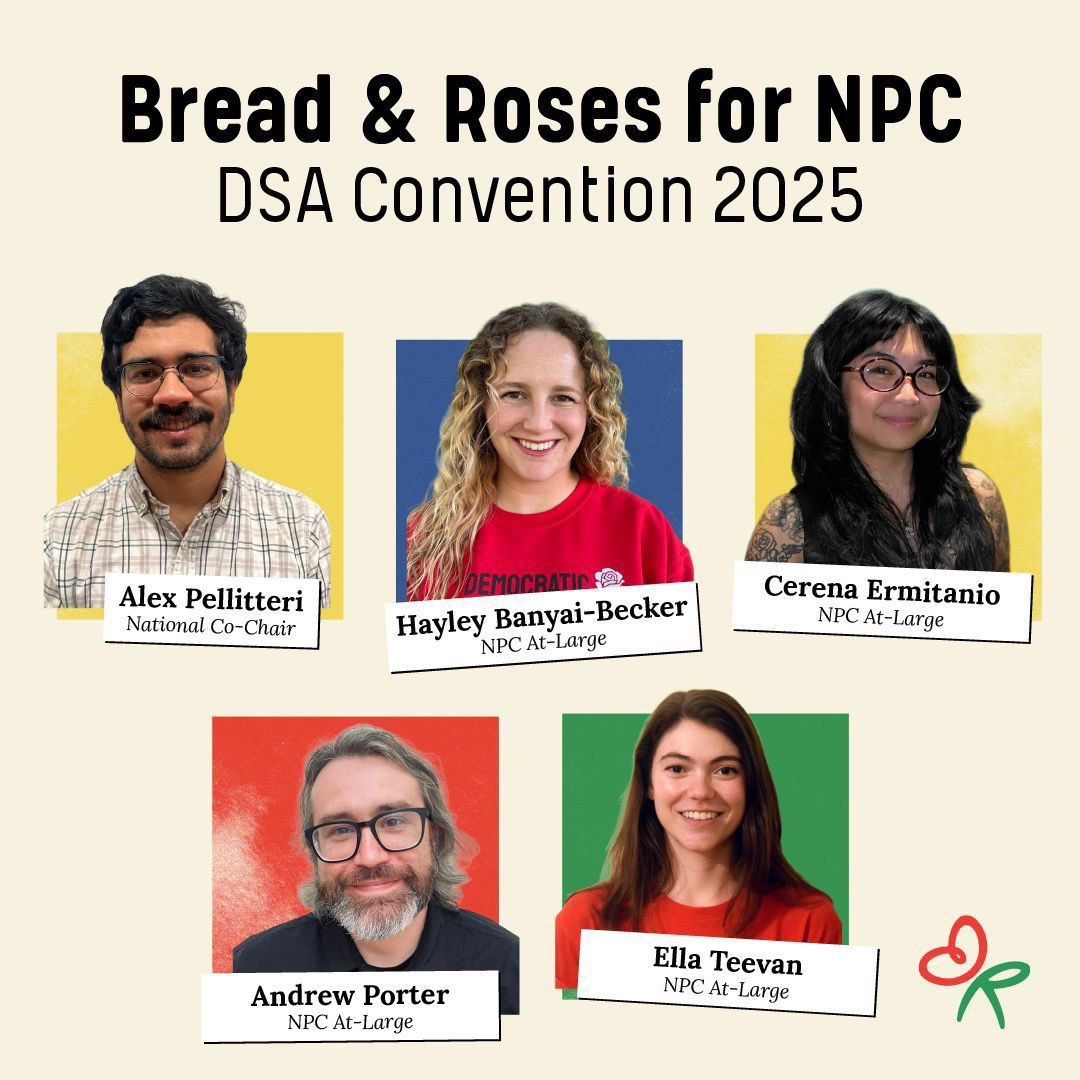The political debate at this year’s DSA Convention was high-quality, with comrades from across the organization making principled points. We don’t have access to all the excellent speeches made, but here are excerpts from a few by Bread & Roses members. If you missed the Convention, you can get a taste of some of the arguments below. Remarks have been lightly edited for clarity and length.
Alex Pelliterri (NYC, elected to the new National Political Committee)
For the amendment “Act Like an Independent Party” to the National Electoral Committee’s consensus resolution. The amendment outlines ways for DSA to construct an independent electoral identity while tactically using the Democratic ballot line.
Who here thinks the leadership of the Democratic Party is incompetent, pro-business, and failing working-class people? Who thinks we need to set the foundations to break from the Democrats and build an independent workers’ party? I have the amendment for you!
We need to move beyond talking about how great it would be to have a workers’ party, and start taking concrete steps to build one. The amendment lays out three ways to help DSA achieve political independence from the Democratic Party.
- Organization: Develop our own infrastructure, database, and volunteers — in many places we are already doing this.
- Strategic: Develop our own legislative priorities and expectations, with candidates caucusing together, bloc voting, and endorsing each other.
- Identity: Expect candidates to proudly identity as democratic socialists and DSA members and create a common DSA identity that campaigns across the country can use to identify as DSA candidates.
We will task the NEC with helping chapters build up electoral infrastructure, a first step to building a more independent political alternative to the Democratic and Republican parties.
Sarah Hurd (Chicago, National Labor Commission Co-chair)
Presenting the NLC’s 2021-23 report.
In 2020, after the pandemic hit, we were able to team up with the United Electrical Workers to launch the Emergency Workplace Organizing Committee. EWOC not only served as an incubator for new unions; it transformed hundreds of people into organizers and gave them a sense of their own collective power.
In 2021, DSA chapters started coordinating across states to support the Nabisco and John Deere strikes. By early 2022, the groundwork was laid to coordinate nationally. This came just in time to support the Starbucks workers’ organizing wave. Our “Solidarity Is Brewing” campaign gave 84 chapters resources and training to lead solidarity projects and build relationships with workers near them.
Meanwhile, we had been doing the slow work of building a layer of trusted leaders in strategic industries. Members in those jobs turned their DSA comrades into coworkers and their coworkers into comrades. DSA members campaigned around bringing new leadership to the Teamsters and UAW, not because they thought the right guy in leadership would save them, but because they saw an opening to go on the offensive in the class war and the opportunity to start building a new army to fight it.
In April 2023, DSA launched our “Strike Ready” campaign to support UPS Teamsters. The campaign was given priority status and at least 100 chapters took part. It invigorated chapters that needed direction and connected our members to workers who have been brought into our project.
We are already setting our sights on future fights like the UAW’s Big Three auto workers contract and organizing Amazon. Through our Labor Solidarity fund we have raised $100,000, and we’ve already given $30k to small chapters supporting big fights like Erie DSA’s support for the Wabtec strike and big chapters like LA providing tacos to striking hotel workers.
This is how we win. By trusting workers to know what they need and by investing time, money, and expertise in supporting them. EWOC was successful because we created an infrastructure for experienced organizers to guide new organizers. “Solidarity Is Brewing” was successful because we threw down with workers doing something people said was impossible. “Strike Ready” was successful because we had a small group of Teamsters who we supported in growing into a large group of Teamsters.
Jane Slaughter (Detroit)
Against the amendment “We are Workers: DSA in a Resurgent Labor Movement” to the NLC’s consensus resolution.
How many of you were at the Labor Notes Conference last year? Four thousand workers looking to put the movement back in the labor movement. If you liked the Labor Notes Conference, you should vote against this amendment.
The amendment downgrades DSA’s relationship with the troublemaking wing of the labor movement. The consensus resolution says that DSA “supports and builds “ Labor Notes, and that’s exactly what we’ve been doing the last few years. DSA’s support has helped enable LN to greatly extend its reach, holding local conferences — Troublemakers Schools — in dozens of cities. DSA members have been the backbone of the local cross-union committees that built those events, which are places where you bring your coworkers to see class struggle unionism in action.
The amendment, on the other hand, just says DSAers “attend” Labor Notes events, along with a short list of other organizations, including the local AFL-CIO.
Labor Notes is not just any labor education organization. It has been the voice and organizer of the class struggle wing of the labor movement for 44 years.
When the writers of the consensus resolution singled out Labor Notes to build and support, that’s a political choice. It says that DSA allies with the wing of the labor movement where rank-and-file workers are organizing themselves to take back their unions. That’s how Labor Notes is different from the AFL-CIO. That’s in line with our 2021 resolution to build “reform caucuses that fight for democracy in their unions.“ Labor Notes supports and builds the movements — TDU and UAWD — that have put class struggle on the national agenda this year — just like DSA does. We built “Strike Ready” to support and build those fights, we don’t just attend.
To weaken our consensus resolution would send the wrong signal about what DSA is about. It would say we’re consciously stepping back from our politics. Militant labor is finally resurgent in 2023. Let’s choose sides, my union siblings: the troublemaking side.
Will Bloom (Chicago)
Against the amendment “We are Workers: DSA in a Resurgent Labor Movement” to the NLC’s consensus resolution.
I want to respond to the argument that this amendment is necessary so DSA can work with union leaders, even those who are DSA members, like Brandon Mancilla, Regional Director of the UAW in the Northeast. That’s a misunderstanding of the resolution and of our wildly successful labor strategy. As Brandon Mancilla himself tweeted yesterday, the base resolution does nothing to affect our ability to work closely with union leaders where it makes tactical sense. All it does is ensure that our strategy and our priority is building the power of, and our relationship with, the rank and file of the labor movement.
As all of our national labor work shows, DSA labor regularly and effectively works with union leaders to advance our labor work, in pursuit of our overall labor strategy of building closer ties between DSA and rank-and-file militants at the shop floor. This is because it’s the shop floor, it’s with these rank-and-filers, that the power lies. A friendly, or even socialist, union president can call all the strikes they want; if the rank and file aren’t on board, it won’t happen. But if the rank and file are organized and militant, they can force even the most conservative union leader to do the right thing.
It’s for precisely this reason that we are able to have the most productive relationships with union leaders in those cases where DSA and the rank and file of the union are already interlinked. That is evident from both our UPS “Strike Ready” campaign and our “Solidarity Is Brewing” Starbucks work. It’s also evident in many of our chapters’ labor work; Teamster comrades like Jesse in Portland and Rosario in New York have easily managed to work with their union leaderships while still maintaining their rank-and-file orientation.
If we want to have the best possible working relationship with union leaders, we must reject a strategy that prioritizes our relationship with those leaders in favor of one that prioritizes a relationship with the rank-and-filers they answer to. Vote no on this amendment.
Honda Wang (NYC, National Labor Commission Steering Committee)
Against the amendment “For a DSA Ready to Move in the Labor Movement” to the NLC’s consensus resolution.
Who here can tell me how many conventions passed a resolution to hire a labor staffer? Who can tell me how many years it took to hire a labor staffer?
I think three conventions and five years was too long of a delay. We were pretty lucky to find our labor staffer, Amanda, just in time for this labor upsurge and she has been critical to the success of the past 12 months.
Because of this success I am urging convention to strike while the iron is hot for the labor movement: to support full-time paid political leadership on the National Labor Commission.
When we staffed up for the “DSA for Bernie” campaign, that investment paid dividends for our organization. If we had waited five years to hire a campaign manager for the DSA Bernie campaign, I don’t know how many of us would be here today. The political moment right now is with the labor movement — ensure we have the capacity to fully engage with it.
Let’s have NLC co-chairs who can spend eight hours a day on our labor work, navigating DSA chapter strike support across the country, coordinating our rank-and-filers in their union reform movements, and building the fighting working class we need to win socialism.
Kristin Schall (Mid-Hudson Valley, elected to the new NPC)
For “Launch a Democracy Commission for DSA.”
Often in DSA, we say that we are building the plane as we fly it, but at some point we have to land the plane and put the pieces in the right order. That is what is at the core of the Democracy Commission. It’s clear that there is a strong consensus in the organization that something has to change for our structures to serve the kind of mass, democratic socialist membership organization that we all want to build, and it’s also clear that tinkering around the edges every two years isn’t sufficient to meeting this need.
The Democracy Commission would convene a multi-tendency group of people from across the organization to try to come up with a solution. It would have two stages. In the first, the commission would study democratically-run socialist parties and organizations from across the world to learn how they do things; it would also assess the current state of DSA and see what’s working and what isn’t. In the second stage, the commission will come up with proposals for how to reorganize DSA to put forward for debate at the 2025 Convention.
Because it’s a slower, more deliberative process, we will only be limited by our imagination what those solutions can be.
Frances Reade (Detroit)
For “Launch a Democracy Commission for DSA.”
We all agree that DSA needs structural reforms. Small groups have tried over and over to push their versions, and they never win or get implemented. It’s time to bring everyone together to develop the changes that will have legitimacy and enthusiasm from all corners of the beautiful big tent. This is crucial for DSA to start acting like the big, vibrant, internally democratic political party we need.
I’m in favor of this resolution because we just tried a version of this model in Detroit DSA and it was a huge success. We’d never held a chapter convention to vote on priorities, and this left political disputes simmering under the surface without a way to resolve them democratically. To design a local convention, we built a group with comrades from MUG, B&R, SMC, Groundwork, and no caucus. By working to develop a great democratic convention together, we were able to build trust, come to shared understanding of the problems in the chapter, and take the ideals of the committee out to our friends and comrades and bring their ideas back. Our convention was a YUGE success with broad participation thanks to the multi-tendency belief in its legitimacy.
This model works to overcome the factionalism and mistrust that can grow in DSA when we don’t commit to working together. Please vote yes and then join the Democracy Commission!
Robert LeVertis Bell (Louisville)
For “Full-time National Chairs.”
Maria Svart deserves all our respect. She has led this organization as National Director through its massive boom and into its status as the preeminent socialist organization in the United States.
But a problem for me is that more people in this country don’t know who Maria or any of our leadership is! I don’t know how many times I’ve talked to people who think Bernie Sanders is the leader of DSA.
There was a time when a democratic socialist was a regular on the news, on late night talk programs, in the media as a representative of democratic socialist politics and giving a democratic socialist response to world events. That person was Michael Harrington, one of the founders of our organization. We don’t have that right now.
The structure of our organization and the fact that we do not have elected political co-chairs, as already allowed in our bylaws, does not adequately empower anyone to speak on behalf of our organization.
Imagine a world in which an official DSA leader was on the news explaining a democratic socialist response to the labor organizing boom we’re experiencing, to Amazon organizing, to teacher strikes, to assaults on Gaza, on abortion and queer rights, to the pandemic. This was a missed opportunity for broad mass political education and for mobilizing for a democratic socialist future.
Elected paid co-chairs will politically empower our leadership to speak for the organization, in our voice, where we are most needed. And will make our leadership positions accessible to more sections of the working class (not just those who have office jobs).
Ramsin Canon (Chicago)
For the amendment “For a Class-Struggle Internationalism” to the International Committee’s consensus resolution.
This amendment does three things: It recognizes that our most critical international work is in a way domestic: what socialists in imperial core nations can do is build the fight against empire into our work. Build a mass movement capable and willing to end an imperialism that puts the thumb on the scale against working-class movements everywhere in the world.
That means ending the funding for an imperial-sized military, ending U.S. covert and overt operations, and stopping the inhumane and criminal collective punishment of entire nations through embargoes, sanctions, and blockades. Building a mass movement against imperialism means communicating that empire doesn’t only face outward. There’s a domestic infection of empire.
Empire’s cost imposes austerity by strangling our budgets. We re-import counter-insurgency tactics to our city streets. We fund the industries that sell weapons and surveillance back to us.
Second, the resolution sets us to a rank-and-file approach. We are not diplomats, we’re organizers and students in the struggle, learning from all parts of the international working class movement, governing and smaller parties, and independent trade unions, including when they may be in a state of conflict with one another. It means working locally with diaspora communities, like my people, who survived by organizing on Devon Avenue and Peterson Avenue, between Ashland and Kimball right here in Chicago.
Finally, it commits us to expand our big tent approach, by developing organic connections, body to body, with workers anywhere in the world who are in motion and in struggle.
Socialism has to engage with and learn from workers engaged in struggle everywhere on earth even when, or especially when, there are contradictions and tensions to work through. We cannot pick and choose the worthy.
Daniil Sapunkov (NYC)
For the amendment “For a Class-Struggle Internationalism” to the International Committee’s consensus resolution.
I wish to speak in favor of class-struggle internationalism from a perspective that is very personal and dear to me: the war in Ukraine.
I was born and raised in Moscow. My family ran away and moved to New York in 2016, where I immediately found myself navigating NYC public high school halls and in the first weeks befriended a Ukrainian boy who is my best friend to this day. Today we find some humor in this because, frankly, humor is the only thing left for us to seek — as his home is getting shelled by bombs and my home is thinning as young people try to escape and hide from the draft and political persecution.
As a Russian immigrant, I feel obligated to call out and criticize Putin and his generals and oligarchs for waging a bloody war in Ukraine and his dictatorial rule at home. And as a principled Marxist, I refuse to support Zelensky’s neoliberal government that has cut workers’ rights, elevated far-right forces, and embedded itself within U.S. empire.
That’s why I support class-struggle internationalism, because the enemy of my enemy is not always my friend. Our strength is in our consistency. And our focus and solidarity must always remain with working people across the globe!
This amendment puts forward powerful principles that connect us with the struggles of workers everywhere, without conditioning our solidarity and relationships on realpolitik geopolitical considerations.
We should be standing in solidarity with and connecting with antiwar organizers and student radicals in Russia and Belarus, as well as Ukrainian socialists on the ground and in exile, both fighting the Russian invasion and their own government’s crackdown on labor.
When the International Committee leadership voted down a campaign in solidarity with Belarusian trade union activists fighting the Russian invasion of Ukraine, it made me believe that DSA must commit to the course of antiwar, class-struggle international solidarity. I don’t want to be a diplomat, I want to be an organizer! And I am standing here because I am ready to do this work in DSA and am excited to join.
Oren Schweitzer (NYC)
For the amendment “DSA Stands with Palestine and the BDS Movement” to “NPC Recommendation #8: BDS Working Group to International Committee.”
My name is Oren and I’m a proud anti-Zionist Jew.
I’ve been involved in BDS work on my campus. I’ve also been involved in the “Not On Our Dime” campaign in New York, getting my father who is a rabbi to sign on to a public letter of support.
This amendment isn’t as strong as I’d like. I believe in stronger criticism of Jamaal Bowman and I strongly disagree with how the NPC dealt with these questions behind closed doors and the disciplining of the BDS Working Group. I support overturning the BDS Working Group leadership suspensions and establishing stronger candidate expectations on Palestine.
But at this point, I also agree with bringing our BDS work under the International Committee. A recent tweet from the Working Group argued that there are no civilians in Israel, effectively saying that civilians were legitimate military targets. I support armed struggle against the IDF and settler militias, but claiming that there are no civilians is not only morally wrong but a strategic disaster that undermines the movement for Palestinian liberation.
At the same time, given our past two years of crisis, this Convention cannot just pass a proposal putting the BDS Working Group under the IC. We need to approve a positive orientation on organizing for Palestinian liberation, moving toward more candidate expectations and a strategy and set of tactics for moving forward this essential work. Despite the limitations of this proposal, it is far stronger than the untenable resolution that would have precluded us from endorsing Bernie Sanders and established processes for member expulsions.




